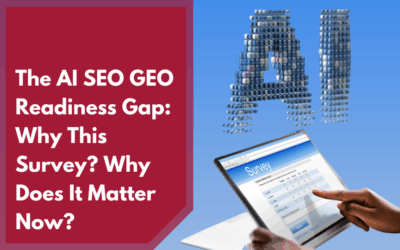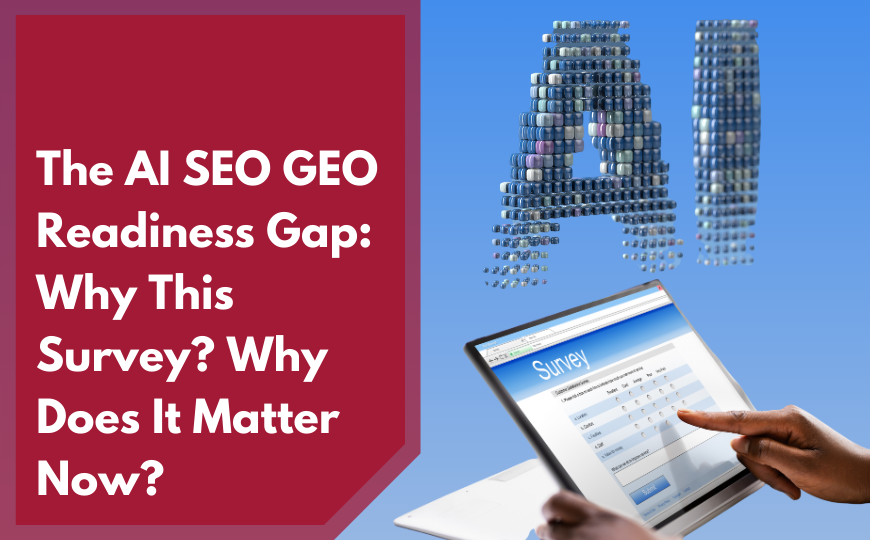The search landscape is undergoing a seismic shift. AI-driven search engines, hybrid search models, and chatbot-powered queries are reshaping how businesses attract and convert leads. As AI-powered search continues to evolve, B2B companies that fail to adapt may face challenges in maintaining visibility and lead generation.
The good news? Those who stay ahead of AI-driven search trends will have a competitive advantage. This article provides a foundational overview of the three pillars of modern SEO—Traditional SEO, Hybrid SEO, and Chatbot Optimization. Mastering these three will make the difference for your B2B company between being found or being forgotten.
1. Why Traditional SEO Still Matters
SEO isn’t dead—it’s evolving. While AI is changing search, foundational SEO principles like content relevance, structured data, and technical optimization remain crucial. Google’s AI-driven algorithms still rely on long-standing techniques:
- E-E-A-T (Experience, Expertise, Authority, Trustworthiness) to determine credibility.
- Structured data to understand and categorize web content.
- Site performance metrics like Core Web Vitals to enhance user experience.
Neglecting traditional SEO while failing to adapt to AI-driven search trends can result in reduced visibility in AI-generated rankings. But staying competitive requires more than just adhering to basic SEO principles—it demands a proactive approach that evolves alongside AI advancements.
One way to achieve this is through semantic SEO, which ensures your content aligns with AI’s understanding of intent rather than focusing solely on keywords. Businesses that embrace topic clusters and optimize for natural language processing (NLP) will gain a stronger foothold in AI-driven rankings.
While AI-driven search engines analyze in-depth resources, structured and well-organized content—whether short or long—performs best. Businesses should focus on clarity, depth where needed, and strategic structuring to align with AI’s content interpretation. AI search engines analyze in-depth resources to generate informed responses. This means B2B companies must publish high-value content that provides extensive insights, industry data, and actionable takeaways.
2. Optimize for AI-Powered Search Engines with Hybrid SEO
Google and Bing are redefining search by integrating AI-generated answers alongside traditional results, while OpenAI’s ChatGPT serves as an AI assistant that provides conversational responses based on its training data and external sources. This new Hybrid Search model favors brands that focus on these tactics:
- Optimize for featured snippets since AI loves concise, authoritative content.
- Leverage entity-based SEO to establish topical authority.
- Adapt to conversational search queries for users asking questions instead of just typing keywords.
- Prepare for multimodal search (text, voice, image, and video).
Hybrid search refers to the growing overlap between AI-generated responses and traditional search rankings. Businesses must optimize for AI-powered content presentation while maintaining strong traditional SEO fundamentals. More than ever, Google’s Search Generative Experience (SGE) and Bing’s AI-driven results prioritize brands with structured, well-researched content that AI can easily digest and present.
To succeed, businesses must shift their focus from ranking for search engine results pages (SERPs) to becoming a trusted AI-cited source. This means producing long-form and research-backed content, improving knowledge graph representation, and structuring content for AI-generated responses.
Moreover, interactive and multimedia content are playing a key role. AI-powered search engines increasingly prioritize content that includes videos, infographics, and interactive tools to enhance user experience. Companies investing in high-quality multimedia content will gain an edge in AI-generated search visibility.
3. Join the Future of Conversational Search with Chatbot Optimization
AI chatbots like Google Gemini, Bing Copilot, and ChatGPT are increasingly being used as research tools, providing conversational responses and summarizing search results, but they do not function as full replacements for traditional search engines. CXOs and decision-makers are increasingly relying on AI-driven assistants for research, making chatbot optimization a must-have strategy for B2B companies.
To stay visible, businesses need to implement these tactics:
- Create structured, authoritative content that AI can pull from.
- Provide direct, clear answers formatted for chatbot responses.
- Optimize for AI citations to be referenced in AI-generated results.
- Develop FAQ-style content that AI chatbots can easily retrieve.
Unlike traditional search, chatbot interactions emphasize immediate, conversational, and authoritative answers. Businesses must optimize content not just for human readers but also for AI systems that extract and synthesize information dynamically. This means leveraging AI-structured data, meta descriptions designed for chat AI, and content that aligns with AI-driven intent prediction.
Optimizing for conversational queries improves visibility in AI-driven responses. While many AI chatbots process voice-based interactions, they primarily retrieve structured content similar to traditional search. Businesses should focus on concise, authoritative, and conversational content for both voice search and chatbot visibility.
Why AI is Business-Critical for B2B Companies
AI search engines aren’t just improving search—they’re creating an entire shift in B2B buyer behavior. Executives and procurement teams are using AI-driven assistants to compare vendors, analyze solutions, and make purchase recommendations. If your company isn’t optimized for AI-driven search, you’re invisible to key decision-makers.
Zero-click searches—where users receive direct answers in search results—have been increasing due to AI-generated responses and Google’s expanding search features, such as Featured Snippets and Knowledge Graph panels. This trend reduces user reliance on individual website visits, making structured, authoritative content even more critical. This means businesses must focus on providing value upfront—by ensuring their brand is embedded in AI-generated results.
This shift means that trust and credibility signals are more important than ever. AI prioritizes information from authoritative, frequently referenced sources. Companies must actively build their authority by proving their relevance to their target audience by engaging in:
- Thought leadership and expert contributions,
- High-quality backlink acquisition from respected industry sources, and
- Consistently publishing research-driven content.
Is Your B2B Company Ready?
Bottom line? The search world of 2025 demands a smarter approach to SEO. Traditional SEO keeps you relevant, Hybrid SEO gets you found, and Chatbot Optimization ensures you remain competitive.
If you are a B2B company that wants to remain relevant and found for the rest of 2025—who doesn’t?—your marketing strategy needs to pivot fast. Companies relying on outdated SEO strategies will struggle to compete in AI-dominated search environments. Forward-thinking organizations will be able to:
- Future-proof their clients’ SEO strategies.
- Leverage AI insights to craft better-performing content.
- Optimize for AI-generated search results and chatbot engagement.
- Ensure brands appear in multimodal search formats, from voice assistants to AI-generated research reports.
- Develop AI-friendly knowledge bases that position businesses as primary sources of information in AI search ecosystems.
Ready to act now to maintain a strong search presence in this evolving digital landscape? Prioritizing AI-driven SEO strategies can give your business a competitive advantage, improving your chances of dominating the search results within your industry. Meanwhile, those clinging to outdated tactics will fall behind.
Now is the time to future-proof your digital presence! Take the next step by registering for DirectiveGroup’s upcoming AI SEO GEO webinar on September 11 at 2 PM ET: “What’s Actually Powering AI Search—and
What to Do About It.”
Our panel of experts will cover:
- The key technical signals AI search engines now prioritize
- Infrastructure and crawl/indexing updates that matter
- Common backend issues surfaced in our CMO survey
- How structured data and schema affect AI visibility
- A preview of the AI SEO Technical Audit
- And more!
Register Today for the Next Webinar → 📅 September 11 at 2 PM ET




